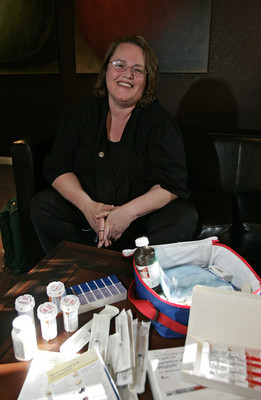LIFE AFTER HEPATITIS
Debra Fox knew something was wrong.
She felt tired. The wound from her recent surgery wasn't healing well. And, worst of all, her urine had taken on a brownish color.
Fox, who had worked in the mental health care field and also as a medical transcriptionist, did some research. And, soon, tests by her doctor would prove her suspicions correct.
Hepatitis C. Contracted, Fox suspects, through hospital error during a surgery she had a few months earlier.
About 12 weeks ago, Fox completed a 42-week course of treatment for hepatitis, a regimen that pretty much trashed her 2007. It was exhausting, physically and emotionally grueling, and, in every way, life-changing.
But, so far, it seems to have worked. And while the 48-year-old knows her life will never be as it was before -- she calls her post-treatment life "the new normal" -- she hopes that talking about her experience can help to calm the fears of at least some of those Southern Nevadans who are waiting to learn whether hepatitis treatment lies in their futures, too.
It has been more than a month since a cluster of hepatitis C cases was traced back to valley endoscopy clinics where syringes and single-use vials of anesthetics were used improperly. Now, more than 40,000 people are awaiting word on the results of HIV and hepatitis tests and, along the way, probably learning more about hepatitis than they ever cared to know.
Hepatitis is a viral disease that attacks the liver, causing inflammation and, in some cases, liver damage, cirrhosis and cancer. There are five varieties of hepatitis -- A, B, C, D and E -- and the viruses that cause it can be transmitted by contact with infected blood or stool. Infection could result from eating contaminated food or drinking contaminated water; getting tattoos, piercings or medical procedures done with nonsterile equipment; through sexual activity; or intravenous drug use.
It's those last two that have fueled public misunderstanding about hepatitis. Even in many news reports, says Robert Barone, an infectious disease therapist who facilitates hepatitis C support groups at the Community Counseling Center, "it makes it sound like most people who have it are IV drug users. As a result, a stigma has arisen very similar to what we went through back in the '80s with HIV."
"I've seen an awful lot of people in the support group here in the last four or five years, and I think if 10 people out of maybe 200 or 300 were IV drug users, I'd be surprised," he adds.
Barone is, himself, a hepatitis survivor. In 1970, after being involved in an auto accident in Europe, Barone was transfused with several units of hepatitis B-infected blood, "and I didn't realize it for almost a year."
Back in the States, Barone underwent a liver biopsy. "They told me I had six or eight months to get my affairs in order," he recalls. "My family kind of freaked. It took me almost two years to believe that I wasn't going to die."
That's not an unusual reaction, says Evelyn McKnight, founder of HONOReform, a patient advocacy group. McKnight contracted hepatitis C in 2001 while being treated for cancer.
"I think whenever you get some health news that is unfavorable, you run through all the possibilities, including the worst-case scenario," McKnight says.
Fox was diagnosed with acute hepatitis C (meaning a short-term, as opposed to a chronic, or long-term, infection) in January 2007. The previous November, she underwent surgery to remove an ovarian cyst, and she believes she was infected with hepatitis by unclean equipment used during the procedure. (Her lawsuit against the hospital is pending.)
Fox says she was healthy and physically active -- she'd even run her first marathon -- before the hepatitis diagnosis. When the news came, she was both shocked and crushed.
"I said, 'You've got to be kidding me,' " says Fox, who describes herself as "the original goody two-shoes. In other words, no risk factors."
"I'm not a weeper," Fox adds. "I wept."
"That first weekend, I thought: I'm dead. I won't be able to have sex. I'm a pariah."
It also crossed Fox's mind that some people would think the worst of her, because so many consider hepatitis as "that druggie prostitute disease."
Fox and her husband have been married for 15 years. Unlike some who undergo the long, grueling course of hepatitis treatment, their marriage survived. But the ripple effects of having, and battling, the disease affected every facet of her life.
"It's not just your marriage," Fox says. "It's your children. It's your insurance coverage now and in the future. It's your employment. It's what is your extended family going to think and what are your friends going to think."
Fox began treatment in March 2007 with daily ribavirin pills and weekly interferon injections. According to the U.S. Centers for Disease Control and Prevention, that combination of drugs is the treatment of choice for hepatitis C and can rid patients of the virus in five to eight out of 10 people.
However, the treatment also can bring severe side effects. Fox understood going in that the side effects can range from mild to moderate to significant. "I had the worst side effects," she says.
"The side effects were as bad as anything I've ever experienced in my entire life, including back surgery," says Fox, who describes them as akin to having severe flu compounded by "the worst hangover you've ever had."
"That first night I remember I was shaking. I had chills. And you think, 'I'm going to die.' "
But, Fox adds, "the caveat here is: It's different for every single person who undergoes it. There are not a lot of generalities."
Nor did Fox ever reconsider her decision to undergo treatment, figuring then and now that it offered "my best good chance" to beat hepatitis.
A few months into treatment, Fox lost her job in the information technology industry. The regimen left her unable to do the traveling the job required and, Fox says, the constant fatigue and "brain fog" the drugs caused made it difficult to concentrate and to remember things.
"All of a sudden, I became physically fragile after being robust," Fox says. "Nausea. No appetite. You can't even carry on the activities of your life."
Barone was out of work for 10 years after receiving his hepatitis B diagnosis. "The first two years I was pretty much bedridden," he says. "At the time, there was no treatment, really." (Today, several drugs can be used to treat chronic hepatitis B.)
At the time, Barone was a contract worker for the federal government. But, during treatment, he lost his health insurance, "so you can just imagine my medical bills over a 10-year period."
Hepatitis treatment also can be mentally and emotionally difficult. In fact, Fox says, doctors often prescribe antidepressants to patients before they begin it.
"The depression the first two years was monstrous," Barone says. "It was just awful."
But that began to change when, oddly enough, Barone started to become angry.
"The person who cut my hair wouldn't cut my hair anymore," he says. "My dentist wouldn't see me anymore. A couple of family members wouldn't come to the house anymore. A couple of friends -- ex-friends, I call them -- wouldn't come near me because they thought I was contagious."
And, Barone says, "I saw what it was doing to my family members and people who cared for me."
Ultimately, Barone says, "anger helped in that I got my ass out of bed and I started doing things that I didn't think I could do because, the first two years, I was in bed most of the time. I was weak, so I didn't have much choice.
"Anger certainly helps, because it motivates you," Barone says.
And, Barone adds, "the most important thing was: I survived." Just as importantly, Barone says it was his bout with hepatitis B that led him into his career in counseling.
Fox completed her course of treatment almost 12 weeks ago. Tests so far reveal good news, although she's still feeling the effects of the rigorous drug therapy.
"Things take a long time to recover," Fox says. "I still have the brain fog and I still have memory recovery problems."
She also suffered kidney problems and now may have developed rheumatoid arthritis because of the treatment.
Mentally, Fox says, "my biggest problem with handling the post-treatment stuff is, it's very slow. I was always a Type A (driven personality) and I can't be a Type A anymore."
But, as of now, "I'm still undetectable for the (hepatitis) virus," she says. "Hopefully, I'm still going to be undetectable."
Does that mean she's cured? Some doctors consider favorable tests six months later as a cure, "but some don't," Fox says.
Barone has been free of hepatitis since 1981. But, he notes, "I still can't donate blood."
"We put 'cured' in quotation marks," Barone says. "So it's a matter of semantics, and how you interpret that word."
Barone urges those who have, or fear they may have, hepatitis to, first, "take the time to educate themselves and ask the right questions."
Then, Barone says, they should understand that "you can lead a fairly normal life, whatever 'normal' means. But some people will give in to it and think of themselves as sick all the time."
Like Barone, Fox now works with hepatitis support groups, sharing her experience with them. "If a single person feels better as a result of talking to me, then it's worth it," she says.
It's easy "to feel sorry for myself and be scared about the circumstances," she says. "You hear people say, 'I'm going to have a biopsy. I'm terrified.' Well, don't be terrified until you need to be, and most of the time it turns out you don't need to be."
Barone, even now, has two papers handy that he shares with clients. One is the written report confirming his hepatitis B test results. The other is the report 10 years later in which "they pronounced me cured."
"I have both of those with me," Barone says. "The reason I carry them is, I show them to people who are very depressed and upset. When they see what I went through and how I survived it, it gives them a lot of hope."
Contact reporter John Przybys at jprzybys@reviewjournal.com or (702) 383-0280.
SUPPORT GROUPS The Community Counseling Center's hepatitis C support group meets Tuesdays at 3 p.m. at 1120 Almond Tree Lane. For more information, call 369-8700, ext. 224. Another support group for hepatitis and other liver diseases meets the first Monday of each month at 6 p.m. in the Physicians Conference Room at Sunrise Hospital and Medical Center, 3186 S. Maryland Parkway. For details, call Saundra Hart at 796-9111. FORMS OF HEPATITIS There are five forms of hepatitis, designated as A, B, C, D and E. It's hepatitis C that is the focus of the current public health investigation about practices at valley endoscopy clinics. While the types of hepatitis differ in terms of how they're contracted and how they're treated, all are viral diseases that attack the liver. Hepatitis can occur in both acute and chronic forms, and hepatitis C can lead to cirrhosis, or liver scarring, liver cancer or other liver damage. "What (the liver) does is destroy the cells that metabolize all the things we eat, the junk we take in, the drugs we take," says Dr. Echezona Ezeanolue, an assistant professor of pediatrics who teaches infectious diseases and clinical epidemiology at the University of Nevada School of Medicine. he liver is a "very resilient" organ, Ezeanolue adds, and can continue to function even if a portion of it is destroyed. That means "you might get an infection and (part of) the liver is destroyed but it's still functioning very well," he says. In fact, in some cases, the hepatitis C already has caused damage to the liver by the time it's discovered, and that can happen long after the infection actually occurred. "A person may be infected for 20 years before they start to show symptoms," notes Evelyn McKnight, founder of HONOReform, a patient advocacy group. "By the time they seek medical care and are diagnosed, they may have very significant liver damage." Hepatitis can be transmitted in several ways. Hepatitis A, for example, is found in the stool of people with hepatitis A, and is spread when someone ingests something -- food, for example -- that has been contaminated with the stool of an infected person. Hepatitis B and C, in contrast, are transmitted when blood from an infected person enters the body of an uninfected person through, for example, a tainted blood infusion, sharing needles used for injecting drugs or an accidental needle stick among health care workers. Ezeanolue estimates that between 50 percent to 85 percent of people who are infected with the hepatitis C virus go on to develop a chronic infection. But, he says, not all chronic infections will develop into acute hepatitis C. "So everybody thinks once you've been exposed and once you get it, you're going to develop disease. That's not true." For more detailed information about hepatitis and hepatitis C, follow the links on the U.S. Centers for Disease Control and Prevention's hepatitis Web site. By JOHN PRZYBYS





























